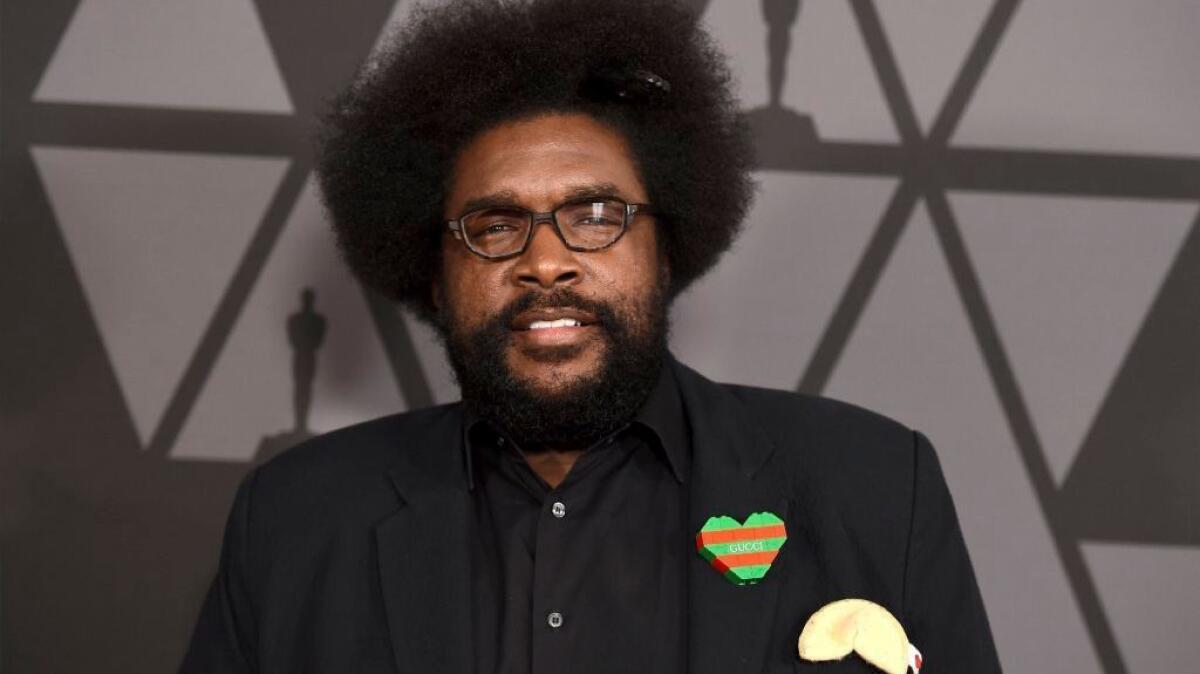The Roots mixed past and present for an impassioned message of injustice

- Share via
Questlove is everywhere, seemingly doing everything, and with aplomb. But when it came to crafting a song to adequately accompany Kathryn Bigelow’s explosive “Detroit,” the affable multi-instrumentalist/producer/bandleader/composer says, “This is a heavy ball to carry.”
Bigelow called him “out of the blue” to see the film, a fact-based period piece about police brutality during the 1967 Detroit riots.
“So I went to this great screening room,” he says, “where they had great snacks, popcorn, the world’s most comfortable chairs, and I saw the most jarring … this happened right when the Philando Castile situation was going down in Minnesota. It was like, ‘God, what do you do?’ So many conflicting emotions.”
The resulting track by Questlove’s band, the Roots (featuring guest vocalist Bilal), “It Ain’t Fair,” is rife with both conflict and emotion. It begins with a gospel a cappella, heats into late-‘60s/early-‘70s socially conscious soul, simmers into a contemporary rap by Roots co-frontman Black Thought, and boils over into Bilal’s raging, ad-libbed outro. The mix of eras has the effect of reminding listeners of the timeliness of the message. But even at its lowest dynamic ranges, at its most legato, the song contains a quiet fury. All over 6 minutes and 41 seconds.
Questlove says, “I told Kathryn, ‘For us to really do this justice, I feel like this song may be seven minutes … This will never get an Oscar, so let’s make it eight minutes long!’ The angriest, seethingest truth we could hold up. I’m shocked people actually took to it.”
Born Ahmir Khalib Thompson in Philadelphia, 1971, Questlove has, with the Roots, become a fixture in a scene they helped create – a fluid mix of expertly played hip hop, soul, jazz and rap. They’ve been the house band for Jimmy Fallon through two late-night shows over eight years and worked with the likes of John Legend, Elvis Costello and others, while Questlove’s many, many side projects include writing books, acting, a podcast and producing for Jay-Z, D’Angelo, Erykah Badu, Amy Winehouse and the “Hamilton” Broadway cast album. Yet all that visibility doesn’t protect him from the same indignities many African Americans endure.
“On average, I get stopped six-to-eight times a year,” he says, matter-of-factly. “Not to make light of it, but three weeks ago – I’m a really heavy sleeper, and coming from a gig in San Diego, my driver, who is a blond female – when we got to the hotel, she said, ‘I think I should let you know, we got stopped by ICE [Immigration and Customs Enforcement] for 20 minutes … You were snoring so hard, I didn’t want to wake you up.’ ”
Questlove says his driver told him the officers eventually recognized him, but “everyone’s not in pop culture. There are cousins of mine, friends of mine, not given that benefit of doubt.”
“It Ain’t Fair” doesn’t shy from describing the relationship many African Americans have with police, in some blistering poetry by Black Thought.
“In 2017, everyone is talking about being ‘woke,’ being knowledgeable about what’s going on in society. He came up with a couplet about people ‘walking in their sleep’ and ‘wolves disguised as sheep,’ even I was like, ‘Who are you?’ ”
Questlove laughs, but to do the film and subject matter justice, the band was deadly serious about sonic authenticity. For that, they went to the pre-digital facilities of Diamond Mine Studios in Long Island City, NY, and worked on equipment from the 1950s and ‘60s.
“It was like we had to be a new band all over again,” he says. “Especially in the mixing process, we would look at each other and be like, ‘Is this us? Who knew?’
“And you can’t be loud at all,” he says. “I know it feels, especially when the rap part starts, big and grandiose. No. We’re literally playing as soft as we can. With that sort of equipment, if you hit loud, it distorts. How do you put emotion and anger into something when you’re playing as soft as hell?”
Much of that power, Questlove says, comes from Bilal’s performance.
“In the last 60 seconds – I told Bilal, ‘I want you to go rogue and express what you feel. You’re a father of a teenager …’ Every black father has this moment with his son: ‘Look, you’re not cute anymore. You’re now a man. You could easily be mistaken …’ So I just wanted him to use all his feelings.
“This one point, ‘Y’all just can’t turn the other way now.’ I was like, ‘That’s the shaking moment I was waiting for, just yelling, “No!”’ That last 60 seconds of the song is what I was looking for.”
See the most read stories this hour »
More to Read
From the Oscars to the Emmys.
Get the Envelope newsletter for exclusive awards season coverage, behind-the-scenes stories from the Envelope podcast and columnist Glenn Whipp’s must-read analysis.
You may occasionally receive promotional content from the Los Angeles Times.










